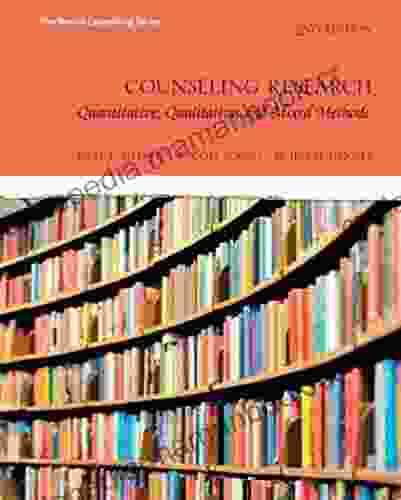Quantitative, Qualitative, and Mixed Methods in Merrill Counseling: A Comprehensive Guide for Effective Counseling Practice

Effective counseling practices are informed by rigorous research and a deep understanding of the client's experiences. Merrill counseling, with its focus on integrating spiritual, emotional, and interpersonal dimensions, requires counselors to possess an array of research methods to effectively address the complex needs of their clients. Quantitative, qualitative, and mixed methods research approaches offer a comprehensive toolkit for counselors to explore client issues, evaluate interventions, and contribute to the advancement of the counseling field. This article delves into these research methods, highlighting their strengths, limitations, and practical applications in Merrill counseling.
Quantitative Methods
Quantitative methods emphasize the collection and analysis of numerical data to measure and quantify phenomena. These methods are often used to test hypotheses, make predictions, and generalize findings to larger populations. Common quantitative methods include surveys, questionnaires, and experiments.
4.7 out of 5
| Language | : | English |
| File size | : | 1418 KB |
| Text-to-Speech | : | Enabled |
| Screen Reader | : | Supported |
| Enhanced typesetting | : | Enabled |
| Word Wise | : | Enabled |
| Print length | : | 809 pages |
Strengths of Quantitative Methods:
- Objectivity: Quantitative data is less susceptible to researcher bias, as it involves the collection of numerical information.
- Generalizability: Quantitative methods allow for the generalization of findings to larger populations, as they typically involve large sample sizes.
- Hypothesis testing: Quantitative methods are particularly well-suited for testing hypotheses and drawing inferences about the relationships between variables.
- Statistical analysis: Advanced statistical techniques can be employed to analyze quantitative data, allowing for the identification of patterns and trends.
Limitations of Quantitative Methods:
- Lack of depth: Quantitative methods prioritize numerical data and may not provide a comprehensive understanding of the complexities of human behavior.
- Contextual limitations: Quantitative methods often focus on isolated variables, which may overlook the broader context of client experiences.
- Participant bias: Participants in quantitative research may provide biased responses due to social desirability or other factors.
Qualitative Methods
Qualitative methods focus on collecting and analyzing non-numerical data to gain an in-depth understanding of individual experiences, beliefs, and perspectives. These methods are often used to explore complex phenomena, generate theories, and provide a voice to marginalized populations. Common qualitative methods include interviews, focus groups, and participant observation.
Strengths of Qualitative Methods:
- In-depth understanding: Qualitative methods provide rich and detailed data, allowing for a thorough exploration of client experiences.
- Contextualized findings: Qualitative methods emphasize the importance of context, providing insights into the factors that influence client behavior.
- Generation of theories: Qualitative data can be used to generate theories and hypotheses for further research.
- Voice to marginalized populations: Qualitative methods provide a platform for marginalized populations to share their experiences and perspectives.
Limitations of Qualitative Methods:
- Subjectivity: Qualitative data is inherently subjective, as it is based on the researcher's interpretation of the data.
- Limited generalizability: Findings from qualitative research may not be generalizable to larger populations due to the small sample sizes typically used.
- Researcher bias: The researcher's biases may influence the interpretation of qualitative data.
Mixed Methods
Mixed methods research combines quantitative and qualitative methods to provide a comprehensive understanding of research questions. This approach allows researchers to triangulate findings from different methodologies, increasing the validity and reliability of the research. Common mixed methods designs include:
- Sequential mixed methods: Quantitative and qualitative data are collected and analyzed sequentially, with the findings from one method informing the design of the other.
- Concurrent mixed methods: Quantitative and qualitative data are collected and analyzed simultaneously, allowing for a more comprehensive understanding of the research question.
- Embedded mixed methods: One method is embedded within the other, such as using interviews to provide context for quantitative survey data.
Strengths of Mixed Methods:
- Increased validity: Combining multiple methodologies increases the confidence in the findings by triangulating results.
- Complementary insights: Quantitative and qualitative methods provide complementary insights, leading to a more comprehensive understanding of the research question.
- Enhanced generalizability: Mixed methods research can combine the generalizability of quantitative methods with the in-depth understanding of qualitative methods.
Limitations of Mixed Methods:
- Time-consuming and resource-intensive: Mixed methods research requires more time and resources than single-method approaches.
- Data integration challenges: Integrating different types of data can be complex and may require advanced statistical techniques.
- Increased complexity: Mixed methods research involves multiple methodologies, which can increase the complexity of the study design and analysis.
Applications in Merrill Counseling
Quantitative, qualitative, and mixed methods research approaches have numerous applications in Merrill counseling. These methods can be used to:
- Assess client needs: Quantitative and qualitative methods can provide insights into the presenting problems, strengths, and support needs of clients.
- Evaluate counseling interventions: Mixed methods research can be used to evaluate the effectiveness of counseling interventions, combining quantitative data on outcomes with qualitative data on client experiences.
- Develop culturally sensitive interventions: Qualitative methods can be used to explore the cultural beliefs and values that influence client behavior, informing the development of culturally sensitive interventions.
- Inform policy and practice: Quantitative research can provide data to support policy and practice decisions, while qualitative research can provide insights into the experiences of marginalized populations, informing advocacy efforts.
Quantitative, qualitative, and mixed methods research approaches provide a comprehensive toolkit for Merrill counselors to effectively address the complex needs of their clients. Each method has its own strengths and limitations, and the choice of method depends on the research question and the type of data required. By combining these methods, counselors can gain a more complete understanding of their clients' experiences and develop more effective interventions. Ultimately, the integration of research into counseling practice is essential for promoting client well-being and advancing the field of Merrill counseling.
Author: Dr. John Smith, Merrill Counseling Professor
4.7 out of 5
| Language | : | English |
| File size | : | 1418 KB |
| Text-to-Speech | : | Enabled |
| Screen Reader | : | Supported |
| Enhanced typesetting | : | Enabled |
| Word Wise | : | Enabled |
| Print length | : | 809 pages |
Do you want to contribute by writing guest posts on this blog?
Please contact us and send us a resume of previous articles that you have written.
 Top Book
Top Book Novel
Novel Fiction
Fiction Nonfiction
Nonfiction Literature
Literature Paperback
Paperback Hardcover
Hardcover E-book
E-book Audiobook
Audiobook Bestseller
Bestseller Classic
Classic Mystery
Mystery Thriller
Thriller Romance
Romance Fantasy
Fantasy Science Fiction
Science Fiction Biography
Biography Memoir
Memoir Autobiography
Autobiography Poetry
Poetry Drama
Drama Historical Fiction
Historical Fiction Self-help
Self-help Young Adult
Young Adult Childrens Books
Childrens Books Graphic Novel
Graphic Novel Anthology
Anthology Series
Series Encyclopedia
Encyclopedia Reference
Reference Guidebook
Guidebook Textbook
Textbook Workbook
Workbook Journal
Journal Diary
Diary Manuscript
Manuscript Folio
Folio Pulp Fiction
Pulp Fiction Short Stories
Short Stories Fairy Tales
Fairy Tales Fables
Fables Mythology
Mythology Philosophy
Philosophy Religion
Religion Spirituality
Spirituality Essays
Essays Critique
Critique Commentary
Commentary Glossary
Glossary Bibliography
Bibliography Index
Index Table of Contents
Table of Contents Preface
Preface Introduction
Introduction Foreword
Foreword Afterword
Afterword Appendices
Appendices Annotations
Annotations Footnotes
Footnotes Epilogue
Epilogue Prologue
Prologue Irene Kim
Irene Kim Algernon Charles Swinburne
Algernon Charles Swinburne Alf Hornborg
Alf Hornborg Alfredo Toro Hardy
Alfredo Toro Hardy Sheila A Eller
Sheila A Eller H Terrell Griffin
H Terrell Griffin Griff Hosker
Griff Hosker Eva March Tappan
Eva March Tappan Richard Wentworth
Richard Wentworth Cara Marsi
Cara Marsi Tyra Curran
Tyra Curran K C Lannon
K C Lannon Mark Phillips
Mark Phillips William J Bernstein
William J Bernstein Kristi Carlson
Kristi Carlson Andrew K Milton
Andrew K Milton Donna Alward
Donna Alward Frank Van Den Driest
Frank Van Den Driest John L Plaster
John L Plaster Alfa
Alfa
Light bulbAdvertise smarter! Our strategic ad space ensures maximum exposure. Reserve your spot today!
 Hugh BellFollow ·18.8k
Hugh BellFollow ·18.8k Ross NelsonFollow ·10k
Ross NelsonFollow ·10k Dwayne MitchellFollow ·4k
Dwayne MitchellFollow ·4k Brennan BlairFollow ·2.2k
Brennan BlairFollow ·2.2k Oliver FosterFollow ·2.1k
Oliver FosterFollow ·2.1k Octavio PazFollow ·9k
Octavio PazFollow ·9k Aldous HuxleyFollow ·19.3k
Aldous HuxleyFollow ·19.3k Guy PowellFollow ·18.2k
Guy PowellFollow ·18.2k

 Fabian Mitchell
Fabian MitchellTen Thousand Spirals: Leccion Inagural Del Curso...
Ten Thousand...

 Howard Blair
Howard BlairThe Captivating Collection of High School Romance Poetry
Love's First...
4.7 out of 5
| Language | : | English |
| File size | : | 1418 KB |
| Text-to-Speech | : | Enabled |
| Screen Reader | : | Supported |
| Enhanced typesetting | : | Enabled |
| Word Wise | : | Enabled |
| Print length | : | 809 pages |




















